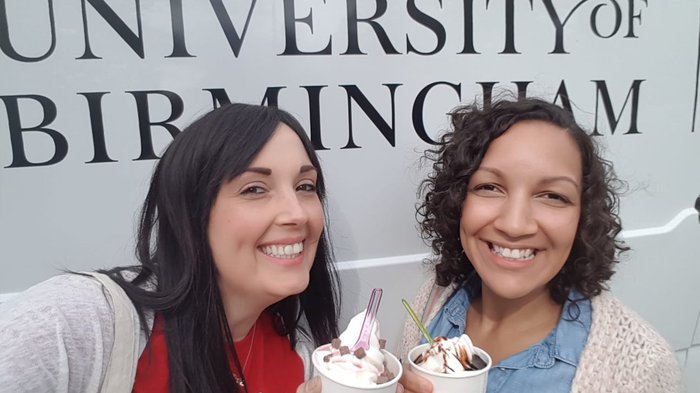Samantha's story
Supporting my friend with leukaemia
Samantha, 31, is supporting her friend Natalie, who was diagnosed with acute myeloid leukaemia in 2016. Following chemotherapy and stem cell transplants, Natalie is now receiving palliative care.

Samantha, 31, is supporting her friend Natalie, who was diagnosed with acute myeloid leukaemia in 2016. Following chemotherapy and stem cell transplants, Natalie is now receiving palliative care.
Natalie had the odd bruise that didn’t go away and had been feeling run down – then her routine asthma check-up showed irregular blood levels. Being a biomedical scientist, she has so much experience in this area. She said, ‘This looks like textbook leukaemia to me.’ I told her I was sure it wasn’t, but there was no doubt in her mind.
She had some follow-up tests and they confirmed her suspicions. Even though she knew exactly what was happening, it wasn’t until then that it hit home for everyone. It was a shock and very overwhelming.
I’m a nurse so, unfortunately, I break a lot of bad news. You can’t put your emotions into it, no matter how well you know the person. Because I’ve learnt to do that at work, I do it in my personal life too. So when Natalie told me, I gave her a hug and told her we’d take it step by step.
The chance to talk openly
I like to be the person she can talk to about anything without worrying I’ll get upset. I try to hold it together, listen and, when she cries, give her comfort without making it about me – because if I got emotional, she might feel she couldn’t talk about it again.
It’s a scary time and it can be hard to know what to say. People skirt around the word ‘terminal’, but make sure you ask those difficult questions: How does it make you feel? Do you want to talk about it? It might be they don’t want to, or they may be waiting for someone to open up to.
Supporting Natalie in different ways
She was really upset about losing her hair during chemotherapy, so I decided to get rid of mine too. When I went to surprise her with it, I let her know I hadn’t put anything on social media. That wasn’t what it was about – I only did it for her. But we decided to post something in the end – and raised £2,000.
If her temperature goes up, she has to go back into hospital to be screened. She can be in there for five days. But we always make sure we’ve got a few things in the diary. I’ll say, “We’ll go to a coffee shop near you, or we’ll have a coffee when you’re in hospital.” We always have a Plan A and a Plan B.
Natalie wrote a bucket list of things she wanted to do. We went to Copenhagen, before it became too risky for her to go abroad, and had a fantastic time.
We’re going to the ballet next month. I might end up having to get my money back if she’s not well enough – and the people I’ve booked it with have said that’s fine – but we’ve got it to look forward to.
Coming to terms with bad news
Natalie’s first stem cell transplant was successful and she went into remission for 15 months. But then she was told the leukaemia had come back and she needed further treatment. The second stem cell transplant didn’t work and I was absolutely gutted.
We’re hoping the latest treatment works, but Natalie knows what could happen and isn’t sticking her head in the sand. I know there may come a point when I have to come to terms with what this would mean for me. Apart from when she has an infection, Natalie looks really well – that’s probably why I haven’t fully dealt with it emotionally.
Getting support for me
I talk to my mum about it. There’ve been a few times when I’ve got overwhelmed and cried. My mum knows Natalie really well and is devastated too, but she’ll just listen. I may need some additional support further down the line, probably from someone more ‘external’ – I don’t think my mum will be able to be as objective with me at that point.
My work’s been really good and have asked if I want any occupational health. My manager’s very supportive. She’s let me know that if Natalie’s husband rings and says, “She needs you now,” I can get up and go, any time. My partner’s great, too. If I tell him I’m seeing Natalie, it trumps everything else.
Valuing our friendship
This is the most important friendship I’ve ever had – Natalie’s more like a sister to me. I lean on her for a lot of support as well. She’s the only person who gives me an honest point of view and doesn’t judge. I can’t imagine her not being there.
I try to see Natalie once a week and speak to her every day. There are times when it helps to talk about what’s going on, but I always try to find a joke and bring it back to the good times.
Janssen-Cilag Ltd has supported Blood Cancer UK with funding for the production of this web page and others within the ‘Living well’ section. It had no influence over the content.
